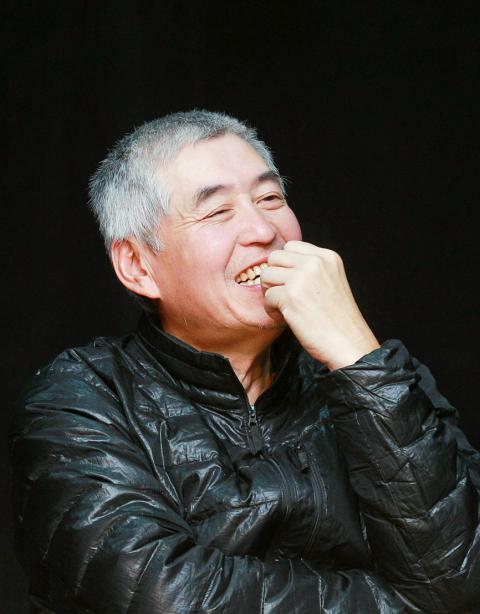Renowned theater director Ko I-chen (柯一正) has reportedly been placed under investigation by the Tax Bureau and accused by the police of having violated the Public Safety Act (公共危險罪), after leading an anti-nuclear flash mob in front of the Presidential Office last month.
The director initiated the “I’m a Man! I’m Anti-Nuclear!” event on Facebook, which drew 60 activists for a quick protest in front of the Presidential Office on May 28. Ko and the others lay down on the Ketagelan Boulevard and formed the Chinese character man (人) for 30 seconds, then shouted: “I’m a man, I’m Anti-nuclear!” before dispersing.
Ko's son, actor Lawrence Ko (柯宇綸), said on Facebook yesterday that his father’s company was now under investigation by the Tax Bureau and that he has been told to report to the police next week for allegedly violating the Public Safety Act.

Photo: Wang Wen-lin, Taipei Times
“This is the Taiwanese government, what a shady national apparatus,” Lawrence Ko said.
“What about letting US beef into the country, restarting the Second Nuclear Power Plant and taking over the Meiliwan area? Aren’t those violations of public safety?” he added, referring to the plan to ease the ban on US beef imports with ractopamine residue, the controversy over the nuclear plant after the discovery that some bolts in the first reactor were broken and the controversial development by the Meiliwan Resort Hotel, which is still under construction despite a court ruling ordering a halt to the work.
Ko I-chen said he would not ignore the police summons and would tell them that what he did was “for your children as well. The events will not cease and everyone will only be more determined.”
Democratic Progressive Party Taipei City Councilor Chien Yu-yen (簡余晏) asked whether police had nothing better to do or if they were trying to get on President Ma Ying-jeou’s (馬英九) good side.
Saying Ko I-chen had led three similar protests and yet the police only singled out the one staged in front of the Presidential Office, Chien said she didn’t know if it was a case of Taipei Mayor Hau Lung-bin (郝龍斌) trying to pander to Ma.
The event was over in 30 seconds, there was no traffic at the time and the event did not obstruct traffic, Chien said, adding that the flash mob fell under the constitutionally protected freedom of speech.
“Are the prosecutors trying to use the case to scare other people in the arts to stop them from caring about public issues?” she said.
Tsuei Su-hsin (崔愫欣), secretary-general of the Green Citizen Action Alliance, said she was surprised Ko I-chen had been called in over the event. Tsuei said her association and other organizations had held an anti-nuclear protest in front of the Taipei Municipal First Girls’ Senior High School on May 29, but they were not called in for questioning.
There were many policemen around on that day, she said, adding that police had privately said Ko I-chen's protest the day before made the Presidential Office lose face, so more police had been deployed.
Additional reporting by Chao Ching-yu Translated by Jake Chung, staff writer

PREPAREDNESS: Given the difficulty of importing ammunition during wartime, the Ministry of National Defense said it would prioritize ‘coproduction’ partnerships A newly formed unit of the Marine Corps tasked with land-based security operations has recently replaced its aging, domestically produced rifles with more advanced, US-made M4A1 rifles, a source said yesterday. The unnamed source familiar with the matter said the First Security Battalion of the Marine Corps’ Air Defense and Base Guard Group has replaced its older T65K2 rifles, which have been in service since the late 1980s, with the newly received M4A1s. The source did not say exactly when the upgrade took place or how many M4A1s were issued to the battalion. The confirmation came after Chinese-language media reported

The Taiwanese passport ranked 33rd in a global listing of passports by convenience this month, rising three places from last month’s ranking, but matching its position in January last year. The Henley Passport Index, an international ranking of passports by the number of designations its holder can travel to without a visa, showed that the Taiwan passport enables holders to travel to 139 countries and territories without a visa. Singapore’s passport was ranked the most powerful with visa-free access to 192 destinations out of 227, according to the index published on Tuesday by UK-based migration investment consultancy firm Henley and Partners. Japan’s and

A Ministry of Foreign Affairs official yesterday said that a delegation that visited China for an APEC meeting did not receive any kind of treatment that downgraded Taiwan’s sovereignty. Department of International Organizations Director-General Jonathan Sun (孫儉元) said that he and a group of ministry officials visited Shenzhen, China, to attend the APEC Informal Senior Officials’ Meeting last month. The trip went “smoothly and safely” for all Taiwanese delegates, as the Chinese side arranged the trip in accordance with long-standing practices, Sun said at the ministry’s weekly briefing. The Taiwanese group did not encounter any political suppression, he said. Sun made the remarks when

BROAD AGREEMENT: The two are nearing a trade deal to reduce Taiwan’s tariff to 15% and a commitment for TSMC to build five more fabs, a ‘New York Times’ report said Taiwan and the US have reached a broad consensus on a trade deal, the Executive Yuan’s Office of Trade Negotiations said yesterday, after a report said that Washington is set to reduce Taiwan’s tariff rate to 15 percent. The New York Times on Monday reported that the two nations are nearing a trade deal to reduce Taiwan’s tariff rate to 15 percent and commit Taiwan Semiconductor Manufacturing Co (TSMC, 台積電) to building at least five more facilities in the US. “The agreement, which has been under negotiation for months, is being legally scrubbed and could be announced this month,” the paper said,